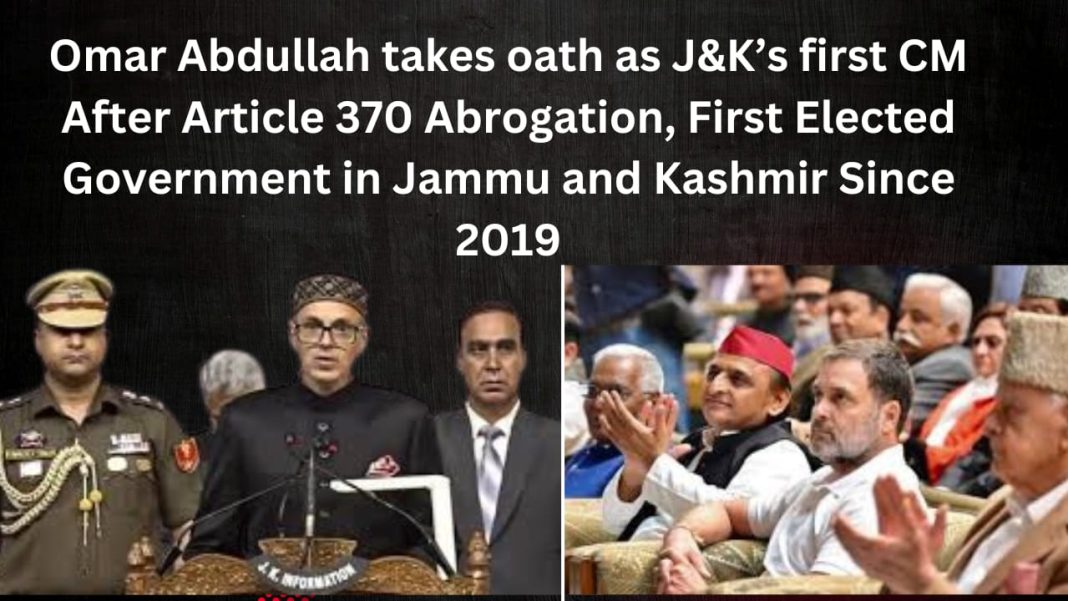Digital News Desk:
On October 16, 2024, Omar Abdullah was sworn in as the Chief Minister of Jammu and Kashmir, marking the formation of the first elected government in the Union Territory since the abrogation of Article 370 in 2019. This significant political milestone comes after five years of direct central rule following the revocation of Jammu and Kashmir’s special status. Abdullah’s return to power, backed by the National Conference (NC) and Congress coalition, symbolizes a renewed attempt to restore democratic governance in the region.
Oath Ceremony in Srinagar
The swearing-in ceremony took place in Srinagar, and was attended by prominent political leaders, including key members of the Opposition’s INDIA alliance, such as Rahul Gandhi of the Congress and Akhilesh Yadav of the Samajwadi Party. This assembly of national political figures underscores the importance of the event, not just for Jammu and Kashmir, but also for the broader political landscape of India.
A major figure in Abdullah’s administration is Surinder Choudhary, who was sworn in as the Deputy Chief Minister. Choudhary, an MLA from the Nowshera constituency, played a significant role in the recent elections, defeating Bharatiya Janata Party (BJP) leader and Jammu and Kashmir party chief Ravinder Raina. His rise to the Deputy Chief Minister position highlights the growing influence of regional voices in Jammu, which leans more towards nationalist politics compared to the Kashmir Valley. His appointment is also a strategic move to balance the political aspirations of Jammu with the demands for greater autonomy in the Kashmir region.

Significance of this new government
The significance of this new government lies in its timing and context. Since August 2019, when the Indian government revoked Article 370, the political dynamics in Jammu and Kashmir have been in flux. Article 370 had granted the region a degree of autonomy, allowing it to have its own constitution and decision-making powers over all areas except defense, communications, and foreign affairs. Its abrogation was a watershed moment, resulting in the region’s bifurcation into two Union Territories—Jammu and Kashmir, and Ladakh—and placing them under the direct control of New Delhi. While this move was hailed by many in Jammu and parts of the Indian mainland, it sparked outrage and protests in Kashmir, where Article 370 was seen as a symbol of the region’s unique identity and autonomy.
Omar Abdullah’s administration is now tasked with managing these divergent political aspirations. His return to power is being seen as an attempt to restore normalcy and address the grievances of the people, especially in the Kashmir Valley, where public sentiment remains skeptical of New Delhi’s actions over the last few years. Abdullah himself has expressed the need for reconciliation and development, and his government is expected to prioritize these objectives. Job creation, economic development, and restoring public trust in the democratic process are likely to be key areas of focus.
Deputy CM of J&K
Choudhary’s appointment as Deputy Chief Minister further represents the desire to bridge the regional divide between Jammu and Kashmir. His influence in the Jammu region, where there has been a growing support for nationalist politics, could help the new administration navigate the complexities of representing both Jammu and Kashmir’s political aspirations. Managing the tensions between these two regions while maintaining a stable relationship with the central government will be one of the administration’s key challenges moving forward.
Security concerns remain high, particularly given the history of unrest in the Kashmir Valley. The region continues to face insurgency, and sporadic violence persists despite efforts by the security forces to maintain order. However, the restoration of an elected government is being viewed as a step toward political stability. Abdullah’s leadership, combined with Choudhary’s role, offers a renewed opportunity to address long-standing issues, including governance, development, and security.
The formation of this government also carries symbolic weight for India’s larger democratic framework. The restoration of a local, elected government in Jammu and Kashmir is likely to be cited by New Delhi as evidence of its commitment to restoring democracy in the region. It also serves as an important message domestically and internationally—that despite the upheaval of 2019, India remains committed to democratic processes.
Conclusion
In conclusion, Omar Abdullah’s swearing-in as Chief Minister marks the beginning of a new chapter in Jammu and Kashmir’s political journey. With Surinder Choudhary as Deputy Chief Minister, the government now faces the challenge of uniting a deeply divided region, ensuring development, and rebuilding trust in democratic institutions. As the first elected administration since Article 370’s abrogation, Abdullah’s leadership will be pivotal in shaping the future of Jammu and Kashmir within the Indian Union.
You May Also Read: India-Canada Conflict: What is the matter? Why did India-Canada’s diplomatic relations sour over time?








